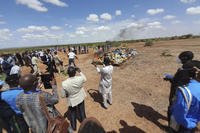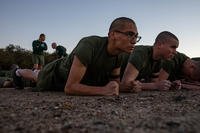DETROIT — The Coast Guard concluded icebreaking operations on the lower Great Lakes, Monday, more than four months after it started, Dec. 15, 2013.
Operation Coal Shovel is a bi-national domestic icebreaking effort covering the St. Lawrence Seaway, Lake Ontario, Lake Erie, the Detroit/St. Clair River System, and southern Lake Huron.
Crews aboard Coast Guard Cutters Mackinaw, Hollyhock, Bristol Bay, Neah Bay and Morro Bay were joined by crews from Canadian Coast Guard Ships Samuel Risley, Griffon and Des Groseilliers during this year’s operation. They teamed together to ensure commercial traffic transited the waterways safely and mitigated any flooding concerns. In total the Coast Guard crews alone conducted more than 2,100 icebreaking hours during the 128 days of Operation Coal Shovel.
Also assisting the ships with ice reconnaissance were aircrews from Coast Guard Air Station Detroit, which flew more than 40 hours in support of the operation, and aircrews from the Canadian Coast Guard. The aircraft provided valuable aerial information on ice concentrations to help allocate icebreakers in the most needed areas and minimize risk to commercial shippers.
During Operation Coal Shovel, U.S. and Canadian Coast Guard crews assisted 184 vessels and provided harbor breakouts to relieve or prevent flooding in four U.S. and one Canadian community.
Each year the Coast Guard and Canadian Coast Guard partner to ensure foreign ships depart the Great Lakes before the St. Lawrence Seaway closes, conduct wintertime search and rescue, minimize potential for flooding, provide assistance to island residents for critical supplies and services, and ensure the safe movement of critical cargoes on lakers during the winter months.
"Although the majority of ice has melted from the waterways in the Operation Coal Shovel area of responsibility, there may still be lingering ice that could pose hazards to recreational vessels," said Chief Petty Officer Gabriel Settel, chief of Coast Guard Sector Detroit Command Center. "Likewise, the water temperatures are still very low and could cause hypothermia within a matter of minutes. Recreational users of the waterways should closely consider these factors before venturing onto the water."
This year's Operation Coal Shovel lasted significantly longer than last year's, which ran from Jan. 3 through March 23, 2013.





























